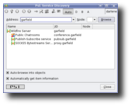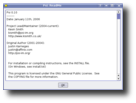Psi is the dedicated client for the Jabber/ XMPP protocol. Based on the Qt toolkit, Psi can run on different operating systems, such as Linux, Microsoft Windows or Mac OS X. Psi was first created by Jutin Karneges, but in 2005 its maintenance fell into Remko Troncon's responsibility. The name Psi is said to stand as an abbreviation for the word psynergy, something like psychic energy, but also from the psi Greek letter, which is also used as logo.
Psi was intended as an easy-to use Jabber/XMPP client, and so it is. Even though it is a single protocol application, it provides some very interesting features such as allowing gateways to other services or file transfer support, even with other Jabber clients, and even with other IM networks, if the user's server supports the feature. What I most liked about Psi is that it is very small, but very fast and responsive in the same time. It benefits from a high cross-platform compatibility, therefore you shouldn't have any problem using it with your operating system, whichever that would be. This is said to be the reason why the skins are not supported by this application. Even though its UI looks pretty neat and elegant, I think a few skins would have been welcomed by the more pretentious users, who care about details such as shape and colors. I could also mention among its defaults that lack of support for more exotic options such as webcam or voice messaging, even though I know that would be a bit too much to ask from a cross-platform, which is more designed to be fully functional on all systems rather than exceeding the expectations for just one of them. However, there are other features about Psi that make it a powerful tool. And the full support it provides for Unicode definitely is worth being mentioned here. Psi also supports basic formatting for both chats and normal messages.
I've heard some claiming that Psi would actually address the more advanced Jabber users. On the contrary, when I started using it I was surprised by the easy and intuitive way one can deal with the program. I'm not exactly a fan of the instant messaging clients, therefore I do not need sophisticated apps to take me ages until I figure out what task accomplishes each of the tens of buttons garnishing it, and in the end to realize I don't need more than 5 of them for the daily use. I can say Psi is not one of them. I found very OK its compact aspect combined with the pretty good power of customization. I do not bump into all kind of more or less useful buttons unless I want to. By default it comes with three customizable toolbars: the Buttons, the Event notifier and the Show Contacts toolbars. You can add/ remove as many buttons you want on them through the Configure Toolbars option that can be reached by hitting the menu button in the down left corner, the one featuring a Greek psi letter. I could say this is the main menu of the entire application, as from here you'll do all the configuration stuff. Here is where you have to come first in order to setup some information regarding your account, such as personal information (nickname, birthday etc) or connection details such as host and port. For that, and more other settings regarding your account just go to the Account Setup section. I must say it took me a while to find that "menu" button, as it looks more like an About button rather than a menu one. I shall also say a few words on the Show Contacts toolbar. This toolbar provides a few options I found very useful such as the Show offline contacts, from where you can choose to see or hide buddies who currently are not signed in, or the Show Away/XA/DnD, which does the same thing for the unavailable buddies.
Remember what I was saying earlier, that even though it is a single protocol messaging client Psi is able to interact with other network protocols too? Well, let me provide you a few details on how this is made. Everything relates to the Gateway (or Transports as they're also called) Jabber components. These components are specially made to interact with other (proprietary) networks (ex. MSN, ICQ etc). In order to use a certain gateway you'll have to browse the server hosting it through the Service Discovery tool. You will probably have to enter a different server's address in order to access different gateways. If you use gateways only on your server, then just open Service Discovery and you should see them in the window below the address bar. After that you'll have to register with your gateway with your ID and password for the network you need and that should be all. You should be able to see in the roster the contacts from the other network.
The Good
Jabber technologies are highly extensible, therefore Psi is able to interact also with the other, proprietary messaging protocols such as ICQ or MSN. The file transfer with Psi depends exclusively on the XMPP/Jabber protocol standards, just like most of everything in Psi.
The Bad
The only bad aspect I found at Psi would be, among the lack of exotic features such as built-in games or webcam support, the fact that it also lacks skins. Leaving the look and feel details aside, on the functionality side Psi works as fine as expected. Since I used it I must say I did not experience any strange errors or forced exits.
The Truth
Psi is the first IM application that is compatible with all major platforms, from Microsoft Windows and Apple Mac OS X to GNU/Linux. Built upon the Jabber open protocol, Psi makes itself noticed through its small size and fast responsiveness.
Curious about Psi? Then you can check out some screenshots below:
 14 DAY TRIAL //
14 DAY TRIAL // 







